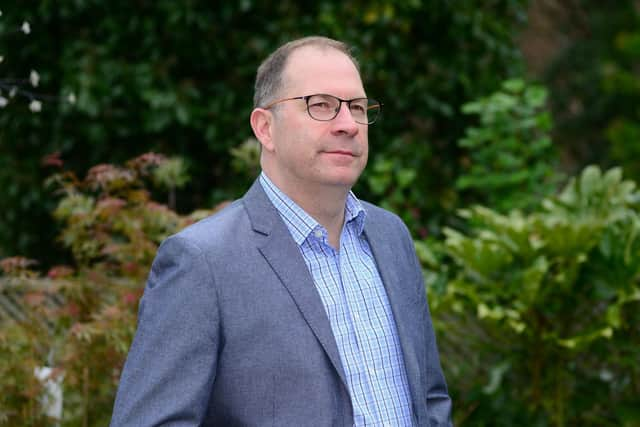Lord Scriven: 'Devolution deals signed in Yorkshire are not the magic wand everyone thinks they are'
and live on Freeview channel 276
And with a career encompassing not only leading Sheffield City Council but also holding senior positions in the NHS, the expertise which Lord Paul Scriven brings to Parliament’s second chamber has come in particularly handy in recent months.
With coronavirus gripping the globe and the importance of councils, and the powers which local leaders have, in the spotlight, the Huddersfield-born Liberal Democrat peer has been calling for leaders on the ground to be put in the driving seat.
Advertisement
Hide AdAdvertisement
Hide Ad“They (the Government) believed it could be run from Whitehall, and because of my experience as a former leader of a council, and my health experience, I could see the two things coming together, which meant that areas, towns and cities, and local boroughs would have to make decisions if there were local spikes,” said Lord Scriven, who in March laid down an amendment which hoped to give councils more powers in tackling the virus.
Now months on from the beginning of the outbreak, directors of public health and council leaders are developing their own systems of tracing cases and have more access to data.
But Lord Scriven fears more could have been done earlier.
After his education at Rawthrope High School, Huddersfield Technical College, and Manchester Polytechnic, Lord Scriven worked for the NHS and was one of only three people in Yorkshire to be fast-tracked into senior management, later becoming one of the youngest hospital managers in the country. It is this experience, plus a career in politics spanning 20 years, that has given him an insight into how to fight the pandemic, and what has gone wrong.
“It is quite surprising considering we’re such a small country, we are very, very, very far from where real power takes place and on the whole that is Whitehall and London,” said Lord Scriven.


Advertisement
Hide AdAdvertisement
Hide Ad“It beggars belief and you can probably tell by my frustration. Why on earth would somebody sat behind a desk in Whitehall, whether it be a senior official or a Minister, feel it wasn’t appropriate to give detailed information down to a local director of public health in a council?
“So they, who have people with shoes on the streets, are able to respond quickly to where spikes or potential spikes are coming.”
And the exasperation is tied to a similar hesitation over devolution deals offered by the Government to Yorkshire areas, which Lord Scriven, who lives in Sheffield with his husband, David, said merely allowed local leaders to put into place decisions already made in Whitehall, perhaps with slight tweaks.
“I don’t disagree with devolution deals,” the 54-year-old said. “I just don’t think they’re the magic wand that everybody feels are going to solve the structural problems (which are) why we have such an unequal country in terms of economically and socially.
Advertisement
Hide AdAdvertisement
Hide Ad“And are they going to be the magic way in which real economic power and social regeneration takes place? They’re going to help, the real issue is partnership between national and local government. In reality it is more or less the same.
“So it’s a scraping of the surface really of how devolution is happening and I actually don’t call it devolution, devolution I think is radical.
“What we have in these devolution deals is decentralisation, just the handing out of a very small part of Whitehall power, with strings attached, out to local areas so they can probably administer them slightly better and make small changes.”
He added: “Real devolution would be talking about possibly local areas being able to develop certain taxes or certain levies or change the amount that they charge compared to other
areas in the country, which is complex.
Advertisement
Hide AdAdvertisement
Hide Ad“But actually it isn’t reinventing the wheel if you take a look across many countries in Europe very close to home, where they have those types of powers.
“Real devolution (is) where levers create incentives for people to come or levers create tax revenue, if that’s what you wish to do, and are available to local areas. Local people can decide whether they’re good things or bad things through the ballot box.
“At the moment all that’s been handed out is you administer what’s already been decided from Whitehall slightly differently, and you can make slight changes.
“So I think it’s those kind of real serious and radical ideas that we’re going to have to get into if we are going to unleash the powers of local people through their local institutions.”
Advertisement
Hide AdAdvertisement
Hide AdLord Scriven said that with both the coronavirus response and its recovery, and also with the debate over devolution, the answer would be to reassess the approach and change the whole framing of the discussion going forwards.
“I think we’ve got to start talking about what it is that we want to do and achieve at each level before we decide which body is best,” he said.
“It is all about structure. It’s all about lines on maps. It’s all about what is going to be delivered.”
- Hear the full interview on The Yorkshire Post's political podcast, Pod's Own Country.
Comment Guidelines
National World encourages reader discussion on our stories. User feedback, insights and back-and-forth exchanges add a rich layer of context to reporting. Please review our Community Guidelines before commenting.